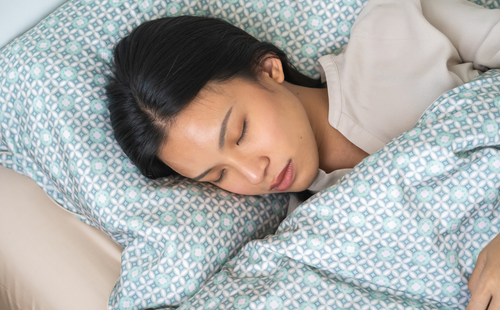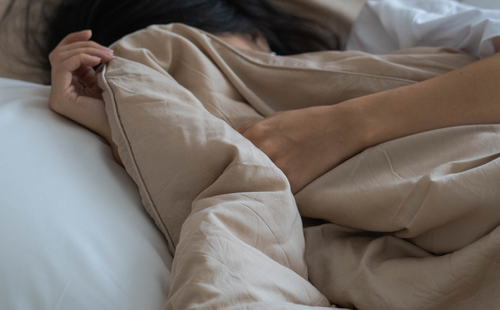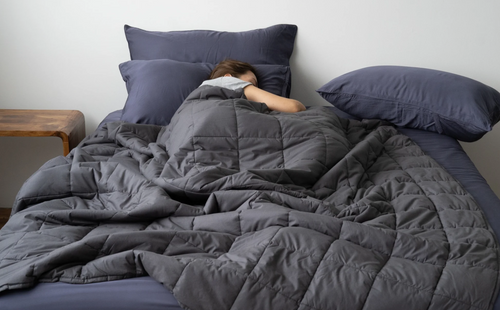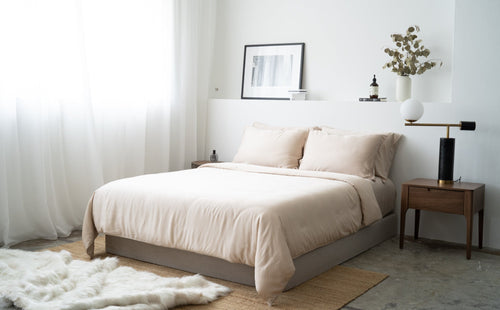At a glance
Good sleep doesn’t happen by chance. It’s built through consistent habits, a calm mind, and the right environment. Follow these science-backed tips to fall asleep faster, stay asleep longer, and wake up refreshed.
Quick tips
- Keep a regular bedtime and wake-up time every day.
- Create a cool, dark, and quiet sleep environment.
- Avoid screens, caffeine, and heavy meals before bedtime.
If you’ve been struggling to fall asleep, waking up groggy, or feeling like your bed is more battle zone than sanctuary, you’re not alone. Millions of adults deal with poor sleep, yet most never fix the root cause.
The internet is flooded with “quick fixes”, but lasting change happens only when you build habits that support your circadian rhythm, relax your body, and calm your mind.
In this guide, we’ll walk through 10 practical sleep hygiene tips that blend science-backed routines with real-world habits.
From building a consistent sleep schedule to improving your sleep environment, you’ll learn exactly how to get better sleep without resorting to pills or gimmicks.
Why Can’t You Sleep Well?
You may not sleep well due to a combination of factors such as stress, irregular routines, late caffeine intake, screen exposure at night, or an uncomfortable sleep environment.
In fast-paced urban settings like Singapore, these lifestyle habits are intensified by long working hours, high mental load, and warm, humid nights, all of which disrupt your body’s ability to wind down naturally.
Singapore ranks among the most sleep-deprived nations in the world, with only 17% of people managing to sleep soundly through the night. This growing issue is often linked to digital overstimulation, long working hours, and the pressure of fast-paced urban living.
Research indicates that blue-light exposure before bedtime can reduce sleep efficiency by nearly 50%, while late-day caffeine intake delays sleep onset and cuts overall sleep duration.

Image By Tirachardz From Freepik
How to Get Better Sleep
1. Create a Consistent Sleep Schedule
Your brain loves rhythm. Going to bed and waking up at the same times every day, yes, even weekends. It helps reinforce your body’s natural sleep-wake cycle.
If you can’t fall asleep within about 20 minutes, get up, read something relaxing, or listen to calm music under low light, then return to bed when you’re sleepy. Over time, your body will associate your bed with rest, not frustration.
Tip: Anchor your wake-up time first. Sleep schedules work best when you commit to a fixed morning wake time and adjust bedtime backwards to ensure at least seven hours of rest. This is one of the most effective sleep tips for adults who struggle with irregular hours.
2. Optimise Your Bedroom Environment
Your room should whisper “sleep”, not “scroll”. Keep it cool, dark, and quiet. The best sleep environment has a temperature between 16°C and 19°C (60°F and 67°F). If you live somewhere warmer, aim for airflow instead of fans, or even cooling sheets.
Blackout curtains can keep streetlights from bothering you, and dim lighting at night tells your body it's time to go to sleep. People who are sensitive to noise can use white noise or earplugs to block out noise all the time.

Image From Freepik
3. Limit Screen Time Before Bed
The blue light from your phone stops the production of melatonin, which is necessary for sleep. To help with this, turn off screens at least an hour before bed. If you need to, you can also use night mode and amber light filters. Writing in a journal or reading are examples of analogue activities that can help reset your mental rhythm.
Blue light wavelengths (460–480 nm) greatly lower melatonin levels and mess up the body's natural sleep-wake cycle. Some studies have different results, but most experts agree that avoiding screens for 60 to 90 minutes before bed will help you sleep better and longer.
As a practical solution, use "Night Shift" or amber filters, dim lighting, and set aside the hour before bed as screen-free time.
4. Practice Relaxation Techniques
You can’t sleep if your mind’s in overdrive. A good bedtime routine should include things that help you relax and calm your body. Try these tips for fast sleep/relaxation methods that have been shown to work by science:
-
Breathing in 4-7-8: Breathe in for 4 seconds, hold it for 7 seconds, and then breathe out for 8 seconds.
-
Progressive muscle relaxation: tense and relax your muscles from head to toe.
-
Visualisation: Imagine being in a calm place, like a beach with waves or a quiet forest trail.
These turn on your parasympathetic nervous system, which is the "rest and digest" mode. This helps your heart rate slow down and your body naturally let go of tension.

Image By Lookstudio From Freepik
5. Watch What You Eat and Drink
Food and drink have a big effect on how well you sleep. Avoiding caffeine for at least eight hours before bed is a good idea because it can mess up sleep cycles.
Alcohol and big meals may make you sleepy at first, but they can also make you sleep less well overall.
It's better to eat small meals and drink a lot of water in the morning. You can have a snack like a banana or some almonds if you get hungry later. Don't drink alcohol before bed because it can mess up your deep sleep and REM cycles.
6. Stay Physically Active (But Not Too Late)
Being physically active (30-60 minutes) during the day promotes deeper, restorative sleep. Regular exercise is an important sleep tip for adults for getting a good sleep because it lowers stress and balances hormones.
However, timing matters. Intense workouts right before bed can raise your heart rate and core temperature, delaying sleep onset. Aim for morning or early evening sessions, and if you must move later, go with gentle yoga or stretches.
A study indicates that daily daylight exposure also helps. Try to get at least 15 minutes of natural sunlight before noon, which reinforces your circadian rhythm and boosts energy regulation.

Image By Jcomp From Freepik
7. Choose the Right Bedding
The next tip for better sleep is to focus on your sleep environment. A suitable bedding environment should feel cool, breathable, and supportive, helping your body relax and regulate temperature naturally. Lightweight fabrics, good pillows, and balanced layers all play a role in improving sleep quality.
Here are a few essentials to create the ideal sleep setup from Weavve Home:
-
Signature TENCEL™ Sheets: Crafted from 100% TENCEL™ Lyocell, these sheets are smooth, cooling, and moisture-wicking, ideal for Singapore’s humid nights. They promote airflow and temperature balance, helping you fall asleep faster and stay comfortable through the night.
Featuring Weavve’s Signature TENCEL™ Classic Set
-
TENCEL™ Lyocell Duvet: Designed to maintain the perfect sleep temperature, this duvet keeps you cool when it’s warm and cosy when it’s cold. Its natural breathability supports uninterrupted rest and prevents overheating.
-
Weighted Blanket: Perfect for anyone who struggles with stress or overthinking before bed. The gentle, even pressure mimics a calming hug, soothing the nervous system and helping you drift off more peacefully.
8. Manage Stress and Overthinking
Overthinking at night is like caffeine for your brain; it keeps it wired. To fight that, write down your worries or things you need to do tomorrow before you go to bed. When you write them down, they stop going around in your head.
If your mind is still racing, gentle breathing or short mindfulness exercises can help a lot. Some people find that ambient sound apps or guided meditations help them “let go”.
9. Keep Naps Short and Early
Taking short naps of 20 to 30 minutes in the early afternoon can help improve focus and boost energy without disrupting your nighttime sleep routine.
However, research shows that long or late naps can interfere with your body’s natural sleep–wake cycle. If you often nap after 5 p.m. and find it hard to fall asleep at night, try doing some light stretching or gentle exercise, or simply drink a glass of water to refresh yourself instead.
10. Know When to Seek Help
If you or your partner notice heavy snoring, pauses in breathing, or gasping during the night, it could be a sign of sleep apnoea or another condition that requires medical attention. Don’t ignore these symptoms, consult a healthcare professional for proper assessment and treatment.
Similarly, if you’ve been dealing with insomnia for more than a month, avoid self-diagnosing. Professional advice can help uncover underlying causes such as stress, anxiety, or other health issues, leading to more effective, long-term improvement.
Recognising when to seek help is an important part of achieving restful, restorative sleep. Because taking care of your health is the first step towards truly good rest.

Image By Pressfoto From Freepik
Frequently Asked Questions
What Are 5 Quick Tips for Better Sleep?
Stick to one sleep schedule, turn off screens before bed, keep your room cool and dark, exercise earlier in the day, and eat light at night. You can sleep better without having to follow complicated rules if you follow these simple habits.
What Is the 10 4 3 2 1 Rule?/ What Is the 10-3-2-1-0 Rule?
The 10-4-3-2-1 rule is a simple evening routine designed to help your body wind down and prepare for sleep. It follows this easy-to-remember guide:
- 10 hours before bed: Stop consuming caffeine
- 4 hours before bed: Avoid heavy meals and alcohol.
- 3 hours before bed: Finish eating for the day.
- 2 hours before bed: Avoid work or mentally stimulating activities.
- 1 hour before bed: Turn off screens and start relaxing.
A similar method, the 10-3-2-1-0 sleep rule, ends with 0 snooze button presses in the morning, encouraging natural, energised wake-ups.
How Do Navy Seals Fall Asleep Fast?
They use the "military sleep method", which means to relax all of your muscles, breathe out slowly, and picture a peaceful place. It is an effective tip for fast asleep quickly because it trains the brain to enter rest mode in under 2 minutes, even in stressful settings.
How to Do a Military Power Nap?
Set a timer for 8–20 minutes, find a quiet spot, relax your body using the same military method, and wake as soon as the timer rings. It restores alertness without deep sleep grogginess.
Transform Your Sleep with Premium Bedding
At Weavve, every piece is thoughtfully designed to bring calm, comfort, and care into your bedroom. Our Signature TENCEL™ Lyocell Collection offer a silky-smooth touch that keeps you cool in Singapore’s humid weather, while our TENCEL™ Duvets regulate temperature for year-round comfort. For those seeking deeper relaxation, our Weighted Blankets provide gentle, even pressure that eases tension and promotes calm before sleep.
With premium materials and mindful craftsmanship, Weavve bedding helps you build the perfect foundation for restorative rest.
“Weavve has always been the hallmark of quality product and amazing service.” - Prateepan V.
“Ever since we’ve started trying Weavve bedding series, we’ve never looked at any other brands again.” - Wendy L.
“I am a repeat customer of Weavve Home. I love the silky and smooth materials used on the sheets and pillow cases.” - Felicia G.









































